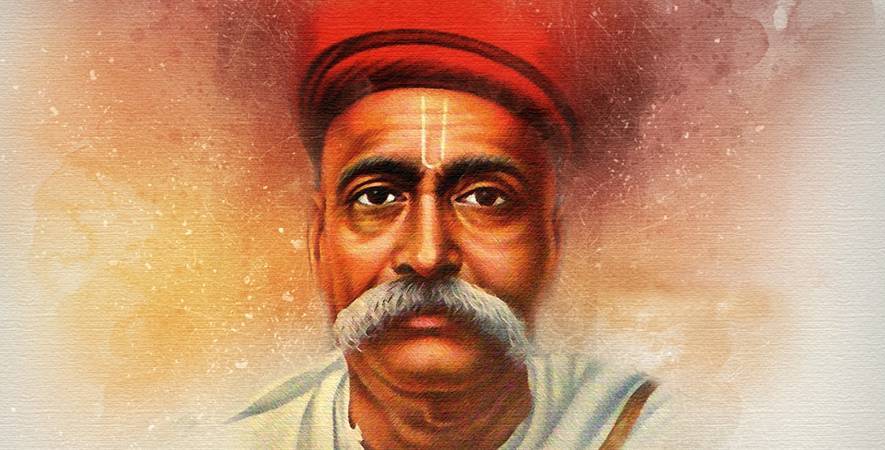Vidyavilas Pathak
Lokmanya Bal Gangadhar Tilak – The bright golden personality in the History of Indian freedom struggle. “Swarajjya is my birthright and I will achieve it…!” with this undaunted spirit Tilak had started freedom struggle of this nation. His mind was full of unrest against British, since his days of education in Pune. The same unrest he transferred into the society and he became father of Indian unrest. He represented all weaker section in society so he was called “Telya-Tambolyaanche pudhari” literally meaning is –Leader of Teli and Tamboli. His freedom struggle was planned quit systematically. He had started Marathi newspaper Kesari in January 1881 and English newspaper Maratha with his co-freedom fighters like Gopal Ganesh Aagarkar and VishnuShastri Chiplunkar. The main aim of newspapers like Kesari and Maratha was to awake common people for freedom struggle, to create awareness for social change and to protest against Governments injustice. In the very first issue of Kesari, the clear purpose was explained. The real usefulness of journalism is the same as the use of lights on the streets at night and the patrolling van of police. In the end of 1882 Kesari became the highest selling newspaper in regional language. In 1884, Kesari’s circulation was 4 thousand 200 hundred, In July 1897 it reached at 6 thousand 900. In 1902 Kesari was read and circulated Brahmadesh (Myanmar), Ceylon (Sri Lanka), Africa and Afghanistan also. At very start, Aagarkar was the editor of Kesari and Tilak was the editor of Maratha. On 3 September 1891 Tilak declared his name as the editor of both Kesari and Maratha. In between he actively participated in prohibition of alcohol, Boycott movement, Plague, overcoming the problems due to draught. He also played an important role in many agitations against govt. One of the fights was regarding freedom of newspapers. Tilak and Aagarkar both were punished and detained in custody for four months by govt. as they had written and published some matter about Diwan Of Kolhapur – Madhavrao Barve.
Kesari had played very important role during drought of 1896 and Pandemic of Plague immediately after that. Tilak had to face sedition charges for three times. In 1897 and 1908, because of his articles against British in Kesari and in 1916 for his speech. The Rand Commission was formed to deal with emergency due to Plague. But white officers under this commission used some drastic measures and soon people became unhappy. So on 22 June 1897 Chapekar brothers assassinated Rand. Tilak had written two editorials “sarkarche doke thikanaawar aahe ka?” And “Rajya karane mhanje sud ugawane nahi” in Marathi language. So he was sentenced to 18 months imprisonment. But after that he was freed on 4 July 1899. He again wrote editorial, “Punach hari om”. On 12 May 1908 and on 9 June 1908 again he wrote editorials and faced sedition charges. “Deshache Durdaiv” and “he upay tikau naahit” these were two editorials. He was sentenced six years jail to be served in Mandalay, Burma and fine of 1000 rs.
He had created small special booklet of three- three and half words. This was guideline for specific words to be used in newspaper. He had written four editorials regarding Marathi writing style. Every newspaper has a language as its editor. Tilak’s language was very sharp and very impressive. His language directly made impact on sentiments of people. We can understand this even if read tittles of his editorials. During 1881 to 1920 Tilak had written 513 editorials. His writings were having different aspects. He had written through the role of journalist, Pandit, Politician and leader. Upliftment of nation and development of humanity these were his inspirations of life. He gave courage through his writings to common people to fight against drought and plague like disasters. The festivals which he had started were not for particular castes, he had proved it through his actions rather than his writings.
About farmers condition, agricultural development and taxation system he had written important editorials. For example – “Jaminichi malki budali” “savkar mela kunbihi mela” and “Ferpahanicha Julum”. He knew that farmer is a very soul of the nation. If we remove curtain of negativity from farmers, then only nation can be progressed. The farmers should feel affinity towards common people and vice- versa.
The population of workers and farmers must be high in the country. The country might be rich or poor it doesn’t matter. Unless there is progress of these elements of society, we can never assume progress of our nation. The true Hindustan is in the villages. So awareness of these villages is very important. He also gave importance to workers class who was working in the factories. From 1902-03 Tilak had started awareness in this class as well. That was the main reason, why workers started strike when Tilak was sentenced in 1908. They continued it for six days despite of pressure by govt.
The politics which was supposed to be area of politicians and field of intellectuals, Tilak explained it in simple language. So people understood and easily attracted towards it. Tilak also actively participated in politics. His speeches was powerful like mantras. So the whole nation stood behind him and he became creator of new peoples era.
Author is former Executive Editor of Kesari (Pune) and having in-depth study of various subjects.



